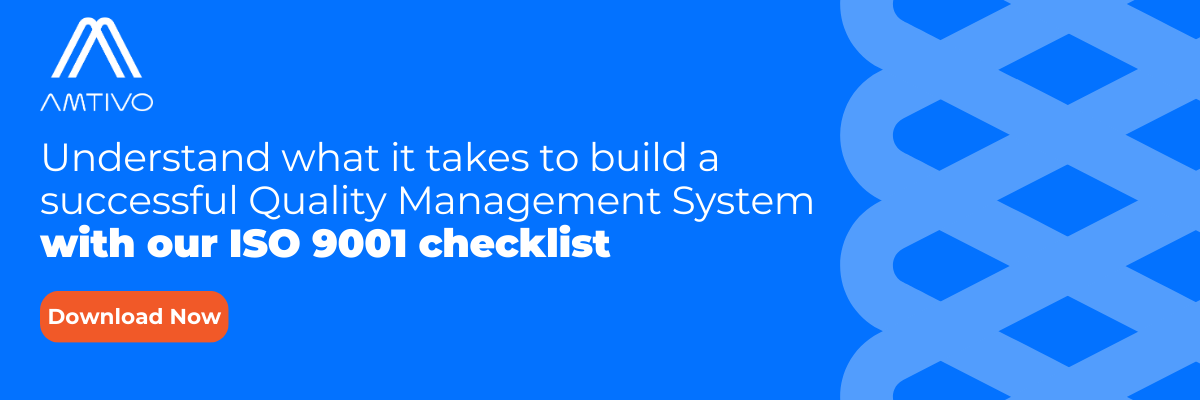Many people ask about the cost of attaining ISO 9001 certification when considering the quality management standard. We explore the factors that can affect certification costs and the level of support you need.
ISO 9001 is a worldwide standard for supporting quality within businesses. It outlines what companies must do to set up and run a certified Quality Management System (QMS).
This standard is based on quality management principles that focus on customer needs, internal processes, and a commitment to continual improvement. Following these guidelines helps businesses produce better-quality products and services, leading to happier customers, lower costs, and more efficient operations.
Cost of ISO 9001 Certification
As with any big business project, getting ISO 9001 certification has a cost, requiring both money and time from your organisation. However, the advantages of having a strong and certified Quality Management System are much greater than these costs.
Getting ISO 9001:2015 certification for your QMS involves multiple steps, and the cost can vary greatly depending on factors like the number of locations your business operates in and the industry you’re in.
Because of this, it’s usually hard to pinpoint an exact price for ISO 9001 certification. Every organisation is unique, and each certification should be relevant to fit the organisation’s specific needs.
Example costs
However, as a guide, a small business with fewer than 10 employees and operating from one location might expect to pay between €4,000 and €6,000 for the initial certification.
Larger organisations would need to budget accordingly.
What Factors Affect the Cost of Achieving ISO 9001 Certification?
Several factors will affect your business’s overall cost of achieving ISO 9001 certification. Knowing these can help your organisation plan and budget for the process.
The main factors are:
-
Company Size – Larger companies may need more resources and thorough audits to make necessary changes for certification.
-
Company Complexity – Organisations with complicated structures, like multiple locations or many divisions, might face higher costs due to the need for more detailed audits.
-
Number of Employees – The more employees your business has, the more extensive the training and communication required, potentially increasing costs.
-
Your Industry – Some industries have specific quality requirements that can make the certification process more complex.
-
Preparation Level – Costs can vary depending on how well your current QMS aligns with ISO 9001 requirements. You might need to make changes or additions.
-
Internal Expertise vs. External Support – Internal knowledge of ISO 9001 and QMS can reduce the need to hire an external consultant for the internal audit stage.
-
Certification Body – Certification bodies may have different pricing structures, so it’s important to compare them to find one that fits your business needs and budget. However, not all certification bodies are the same – check out our ISO Buyer’s Guide to help you avoid some of the common pitfalls.
-
Geographical Location – Auditor costs, travel expenses and local market conditions could cause certification costs to vary by location.
-
Additional Services – To complete certification, additional services such as quality testing and training may be required, which can increase costs.
The Cost of Each ISO 9001 Certification Stage
There are several stages to ISO 9001 certification, each with its own costs.
Preparation Stage
This first phase involves familiarising yourself with the ISO 9001 standard. You may wish to buy the official ISO 9001 standards document from the International Organisation for Standardization (ISO), which costs about $170.
While you don’t have to buy this document, it’s usually helpful because it provides detailed advice on what to do and the best practices for ISO 9001.
When reviewing these requirements, many businesses realise they already meet many of them because of their existing operations, such as quality control processes or ways to gather customer feedback.
You can also find out more about the requirements with our free ISO 9001 key requirements checklist.
Training employees or hiring a consultant can help your organisation understand the complexities of the standard.
Alternatively, you might consider investing in software to help you build an ISO 9001-certified QMS.
A crucial task at this stage is to do a gap analysis of your QMS to identify areas for improvement. Implementing these changes may involve costs, such as buying new tools.
Discover our free ISO 9001 training course.
Documentation Review and Internal Audit (Stage 1)
This phase can require a significant investment of money, time, and resources, as it typically involves creating, reviewing, and updating the documentation needed for ISO 9001 compliance.
An internal audit is also crucial for successful certification. You can use an in-house auditor or hire a third-party consultant for this.
The audit results might require additional investments to verify that your QMS meets ISO 9001 standards, such as training, software tools, or equipment.
Certification Audit (Stage 2)
The final stage is the certification audit conducted by an accredited certification body.
An auditor will thoroughly evaluate your QMS to verify that it meets the requirements of the ISO 9001 standard and, if everything checks out, award certification.
At this stage, you might also incur additional costs for updating marketing materials and websites with certification logos and branding, which can vary depending on the certification body.
Annual audits
Remember that once certified, the organisation must follow a three-year cycle of annual audits. These audits focus on maintaining standards.
Can My Organisation Do It Alone?
ISO 9001 isn’t overly complicated – the main question is whether you have the resources to implement it while managing your regular work.
Most of our clients don’t have a dedicated “Quality Manager,” but that’s okay. You just need someone who understands your business well enough to take charge of quality management and internal audits.
Choosing someone from your own company can save money and help your team learn more about ISO 9001. However, internal auditors must be unbiased and well-trained, so you might need to invest in their training.
They’ll also need to focus on the audit, which could mean temporarily stepping away from their usual tasks.
Cost of an External Consultant
You don’t have to hire an outside consultant for the certification process, but you can bring one in at any time to assist your team with their specialised knowledge and experience.
Consultants usually charge either a project fee or a daily rate, ranging from about €400 to €1,000 per day. Their services vary, and they typically do more than just conduct an audit for your business.
While hiring an external consultant is an extra cost, they might help you complete the building of your management system faster and more efficiently, possibly identifying issues your team could overlook. Their expertise might be worth the additional expense, especially for complex or highly technical audits.
Consider your budget and internal capabilities to decide what’s best for you.
Fill out our “Find an ISO Consultant” form to start your search for an external consultant.
Certification Body Costs
Choosing an accredited certification body for ISO 9001 certification is crucial for demonstrating credibility and reliability.
Many industries and government contracts require ISO 9001 certification from an accredited certification body. It means that your certification will be accepted and recognised globally.
Accredited certification bodies follow rigorous assessment procedures, ensuring that your Quality Management System is reliably evaluated and certified.
Amtivo is an INAB-accredited body offering ISO certifications recognised worldwide.
Avoid Hidden Costs
When getting a quote from a certification body, be sure to check what’s included. Look out for extra costs that might come up later. Your quotation should include:
-
Stage 1 and Stage 2 audits
-
Compliance and administration tasks
-
Travel fees for auditors
-
Management fees
Be cautious of quotes with very low fees, as they may indicate a short or inflexible contract. The standard is a three-year contract.
Annual Surveillance Costs
Annual surveillance audits are needed to show that your company still meets the ISO 9001 standards and to keep your certification. These audits involve regular checks to make sure your QMS is effective and to spot new areas for improvement since the last audit.
An accredited certification body usually conducts these audits, and the costs can vary depending on the same factors as for the initial certification but are typically lower due to fewer days being required to complete the assessments.
Budget for these costs to help your company stay compliant, build trust with stakeholders, and maintain a competitive edge in quality management. While annual audits are typical, some certification bodies might require them at different intervals.
Re-Certification Audit Costs
Once your organisation achieves ISO 9001 certification, it must undergo a re-certification audit every three years. Failure to do so will result in your certification being withdrawn.
The re-certification process involves a detailed review of your QMS to verify that it’s being well-maintained and that its policies, procedures, and controls are continually improving. These audits usually cover your quality management practices and how you handle incidents.
Ways to Reduce ISO 9001 Certification Costs
Strategic planning can help cut the cost of ISO 9001 certification:
-
Conduct a Gap Analysis – Before you start the certification process, check your current quality management practices to find areas that need improvement. This helps avoid wasting time and resources later on.
-
Project Management – Good project management can keep the certification process on track and within budget.
-
Use Existing Systems – Base your QMS on current policies and procedures to reduce the need for new investments in tools or processes.
-
Work With Existing Systems – Build your QMS on existing policies, procedures and quality measures to minimise the need for new investments in tools or processes.
-
Internal Expertise – Use staff who already have expertise in quality management to oversee parts of the certification process. Training these employees can be more cost-effective than hiring outside consultants.
-
Phased Implementation – Consider implementing the certification in stages, focusing on high-impact areas first. This spreads costs over time, making the process more financially manageable.
Is ISO 9001 Certification Worth It?
Although becoming ISO 9001-certified may require time and money, many companies consider the return on investment worth it.
ISO 9001 certification offers numerous benefits that can make the investment worthwhile. It enhances customer satisfaction by helping businesses deliver consistent quality in products and services, leading to increased customer loyalty and repeat business. The certification also improves operational efficiency by streamlining processes, reducing waste, and minimising errors. Additionally, it boosts credibility and competitiveness in the market, opening doors to new business opportunities and often being a prerequisite for contracts and partnerships.
Get Started on Your Certification Journey
Amtivo can provide your business with expert support throughout the ISO 9001 certification process. Our auditors are with you from the initial audit to your recertification audit three years later.
We promise no hidden costs and transparent pricing at each step.
Get started on your journey to ISO 9001 certification – get a quote or contact our team to discuss your needs.





